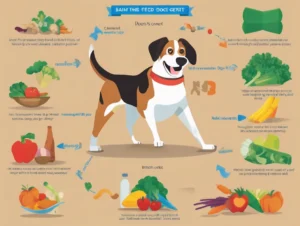Your Dog’s Diet And Their Digestive Health
The Gut Connection: How Diet Impacts Canine Digestion
Just like us, dogs rely on a healthy digestive system to function properly and absorb essential nutrients from their food. Disruptions in the digestive system can lead to a variety of unpleasant signs and potential health complications. Fortunately, diet plays a significant role in promoting gut health and preventing digestive problems in dogs.
Dietary Considerations for Optimal Digestion:
- Balanced Nutrition: Feeding your dog a high-quality, balanced diet formulated for their age, breed, and activity level is essential. Look for diets that provide adequate protein, carbohydrates, healthy fats, fiber, vitamins, and minerals.
- Fiber Power: Fiber is crucial for gut health. It promotes regular bowel movements, helps maintain a healthy gut microbiome (the community of good and bad bacteria in the intestines), and contributes to a feeling of fullness. Choose diets rich in prebiotic fiber to nourish beneficial gut bacteria.

- Hydration: Ensure your dog has access to fresh water throughout the day. Dehydration can contribute to constipation and other digestive issues.
- Food Sensitivities: Some dogs may have sensitivities or allergies to certain ingredients in their food. These sensitivities can manifest as digestive problems like vomiting, diarrhea, or flatulence. If you suspect your dog has food sensitivities, consult your veterinarian about an elimination diet to identify triggers.
- Probiotics: Probiotic supplements containing live beneficial bacteria can help restore the balance of gut flora and promote digestive health, especially after antibiotic use or during flare-ups of digestive conditions like IBD.
Beyond the Food Bowl:
In addition to diet, other lifestyle factors can influence your dog’s digestion:
- Regular Feeding Schedule: Sticking to a consistent feeding schedule helps regulate digestion and prevent digestive upset.
- Slow Feeders: For dogs who gobble down their food, slow feeder bowls can encourage slower eating, which can aid digestion.
- Exercise: Regular exercise promotes gut motility and overall digestive health.
- Stress Management: Stress can negatively impact digestion. Providing a calm and enriching environment for your dog can help reduce stress levels.
Working with your veterinarian to develop a tailored diet and lifestyle plan can significantly improve your dog’s digestive health and prevent future problems. By prioritizing gut health, you can help your furry friend enjoy a happier and healthier life!

A Deep Dive into Doggy Digestion: From Mouth to Tail
Understanding how your dog’s digestive system works is essential for maintaining their overall health and well-being. Just like us, dogs rely on a complex digestive process to break down food, absorb nutrients, and eliminate waste. Let’s explore the journey a meal takes through your dog’s digestive system:
The Digestive Journey:
The Mouth: The digestive process begins in the mouth. Your dog’s teeth tear and grind food into smaller pieces, while saliva mixes with the food, containing enzymes that start to break down carbohydrates.
The Esophagus: Muscles in the esophagus propel the chewed food down to the stomach through a muscular tube.
The Stomach: The stomach acts as a muscular sac that stores and mixes the food. Gastric juices, containing hydrochloric acid and enzymes like pepsin, further break down proteins and fats. The stomach also churns the food into a soupy mixture called chyme.
4. The Small Intestine: This is the primary site for nutrient absorption. Chyme from the stomach enters the small intestine, where it mixes with pancreatic juices (containing enzymes for digesting protein, carbohydrates, and fats) and bile from the liver (which helps break down fats). The small intestine has a large surface area due to finger-like projections called villi, which maximize nutrient absorption. Here, digested nutrients like sugars, amino acids, fatty acids, vitamins, and minerals pass through the intestinal wall and into the bloodstream.
5. The Large Intestine: The large intestine absorbs water and electrolytes from the remaining chyme, forming stool. The beneficial bacteria in the large intestine (microflora) play a vital role in digestion by aiding in nutrient absorption, breaking down complex carbohydrates, and producing vitamins.
6. The Rectum: Waste products are stored in the rectum until eliminated through defecation.
The Microflora Powerhouse:
Millions of beneficial bacteria reside in your dog’s digestive system, particularly the large intestine. This microflora plays a crucial role in:
- Nutrient Absorption: Microflora aid in the breakdown and absorption of certain nutrients.
- Immune System Function: A healthy balance of microflora helps support your dog’s immune system.
- Digestive Health: Microflora contribute to a healthy digestive environment and help prevent the growth of harmful bacteria.
Maintaining Digestive Harmony:
Several factors can influence the delicate balance of microflora in your dog’s digestive system:
- Diet: A balanced diet rich in prebiotics (fibers that nourish good bacteria) is essential for gut health.
- Medications: Antibiotics can disrupt the gut microbiome.
- Stress: Stress can negatively impact digestion and microflora balance.
Importance of a Healthy Digestive System:
A healthy digestive system is vital for your dog’s overall well-being. When digestion functions properly, your dog can absorb essential nutrients from their food, maintain a healthy weight, and have a strong immune system. Conversely, digestive issues can lead to a variety of problems, including vomiting, diarrhea, constipation, and even weight loss.
By understanding the key components of your dog’s digestive system and the importance of gut health, you can make informed choices about their diet and lifestyle to promote optimal digestion and lifelong well-being.
Fueling Fido: How Diet Impacts Canine Digestion
Your dog’s diet plays a fundamental role in their digestive health and overall well-being. The food you choose can significantly influence the delicate balance of gut bacteria and nutrient absorption. Here’s how to make informed dietary choices to promote optimal digestion in your furry friend:
Dietary Do’s and Don’ts:
- Consistency is Key: Avoid frequent diet changes, as this can disrupt the gut microbiome and lead to digestive upset.
- High-Quality Ingredients: Choose dog food formulated with high-quality, easily digestible protein sources like chicken, fish, or lamb.
- Mind the Fiber: Fiber is essential for gut health and regulating bowel movements. However, too much fiber can be difficult for some dogs to digest. Look for diets with moderate fiber content or consult your veterinarian about adding fiber supplements if needed.

- Carbohydrates for Energy: Carbohydrates provide a readily available source of energy for your dog. Look for diets containing digestible carbohydrates like brown rice, sweet potatoes, or oatmeal. Limit simple carbohydrates like white flour, which can contribute to digestive issues.
- Fats for Fuel: Fats are an essential part of a dog’s diet, providing energy and supporting healthy skin and coat. Choose diets with moderate fat content from healthy sources like chicken fat or fish oil. If your dog has sensitive digestion, a lower-fat diet may be recommended by your veterinarian.
- Probiotics and Prebiotics: Consider adding probiotics (live beneficial bacteria) or prebiotics (fibers that nourish good bacteria) to your dog’s diet to promote gut health and digestion, especially after antibiotic use or during flare-ups of digestive conditions.
Addressing Digestive Issues:
If your dog experiences digestive problems like vomiting, diarrhea, or constipation, consult your veterinarian promptly. They can help identify the underlying cause and recommend a specialized diet formulated for sensitive digestion. These diets may include:
- Limited Ingredient Diets: These diets contain a single protein source and a single carbohydrate source, making it easier to identify food sensitivities.
- Hydrolyzed Protein Diets: In these diets, protein sources are broken down into smaller components, making them easier to digest for dogs with protein allergies.
Remember: Never make drastic dietary changes without consulting your veterinarian. They can guide you towards a balanced and appropriate diet that promotes optimal digestion and a healthy gut for your dog.

The Victory Of Animal Abusers Over Animal Lovers In Iran
Facebook Twitter Pinterest LinkedIn1. Weaknesses in Legal and Executive Structures: One of the most significant challenges in the field of animal welfare in Iran is

Caring for Senior Dogs: Essential Tips for Keeping Your Aging Pet Healthy and Happy
Facebook Twitter Pinterest LinkedInWhy Senior Dog Care is Different Common Health Issues in Senior Dogs Common Health Problems in Older Dogs As dogs age, just

Effective Weight Management for Dogs: Best Diets and Exercise Tips
Facebook Twitter Pinterest LinkedInWhy Weight Management is Important for Dogs Health Risks of Overweight Dogs Health Risks Associated with Pet Obesity Pet obesity is a



